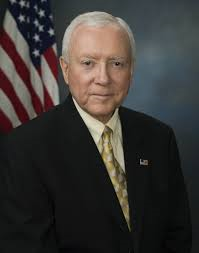
Orrin Hatch: Religious Liberty and the National Defense Authorization Act
http://www.deseretnews.com/article/865667153/Religious-Liberty-and-the-NDAA.html
Throughout my time as a U.S. senator, I’ve been a strong advocate of religious liberty. I’ve made this issue a priority both because I believe it’s the right thing to do and because I know religious liberty is important to many Utahns.
For a long time, religious liberty was an issue around which both parties could unite. But things are changing, and not for the better.
President Barack Obama in particular has done much to undermine religious liberty. He has even gone so far as to threaten to cut off funding for the entire Department of Defense rather than allow religious employers to hire in accordance with their religious beliefs.
The story begins two years ago, when Obama issued a sweeping executive order prohibiting federal contractors and grant recipients from taking into account sexual orientation or gender identity when making employment decisions.
What was troubling about Obama’s order was that it contained no exemption for employers with religious affiliations. For years, laws prohibiting discrimination in employment and housing have routinely included religious-liberty exemptions to protect religious organizations from having to take actions that contravene their beliefs. Such exemptions, for example, permit a religiously affiliated school like Brigham Young University that holds traditional views on marriage and human sexuality to offer married housing only to couples of the opposite sex or to decline to hire as a faculty member an individual in a committed same-sex relationship.
Obama’s decision not to include a religious-liberty exemption in his executive order marked a sharp turn in the wrong direction. One year earlier, Senate Democrats had agreed to include a robust religious exemption in a bill prohibiting sexual-orientation discrimination in hiring. The bill’s exemption tracked similar provisions in numerous state laws, including Utah’s.
Notwithstanding requests from religious groups, Obama refused to include a similar exemption in his executive order. His refusal means that a religious organization that wishes to compete for federal funds may be forced to hire individuals who hold views or engage in conduct contrary to the organization’s religious beliefs. This is a direct attack on the ability of such organizations to preserve and promote their religious identity.
Obama’s refusal to include a religious-liberty exemption in his order was jarring. But even more jarring was what he did next.
Earlier this year, the House of Representatives passed the annual National Defense Authorization Act, or NDAA, to fund the armed forces. The act contains a provision clarifying that religious organizations that contract with or receive grants from the federal government do not lose religious-liberty protections that they enjoy under other laws merely because they choose to work with the federal government. These protections include the ability to hire “individuals of a particular religion to perform work connected with (the organization’s) activities” and to “require that all applicants and employees conform to the (organization’s) religious tenets.” Such protections enable religious organizations to preserve their religious identity by hiring employees who share the organization’s religious beliefs.
Obama swiftly expressed his opposition to the NDAA provision. Not only that, but he said he would veto the entire bill — cutting off funding for the entire Department of Defense — rather than allow the provision to take effect. Obama would rather shutter our armed forces than enable religious employers to select employees who share their values.
There's nothing that inspires creativity more than creativity.
It’s difficult to imagine a position more at odds with our heritage of religious freedom. Obama would empower the federal government to compel religious organizations to hire people who do not share the organization’s religious beliefs. He would insert federal tentacles into fundamental decisions on religious mission and identity. He would have the federal government declare off-limits traditional views on sexual orientation and gender identity that many Americans — including many Utahns — hold as a matter of religious conviction.
Our state is blessed with a number of religious employers that do important work for our communities and our country. I urge my colleagues to stand up to the president’s extreme position and defend the right of these organizations to maintain their religious identity by selecting employees who share the organization’s beliefs.
Orrin Hatch is the senior U.S. senator from Utah.